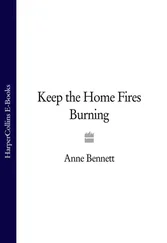The river was dark now, the first indication that the day was ending although there was still abundant light in the sky. She led the way back onto the road, bringing them out near the high school, where long-limbed teenagers were running on the outdoor track, piles of muddy snow pushed to the corners of the field.
“Can I ask you something?” he said. “The turban. Is that a style thing or a Muslim thing?”
“You know, the only two people in Massachusetts who have ever asked me about it both wanted to know if it’s a style thing or a chemo thing.”
Laughing, he said, “Cancer or Islam — which is the greater affliction?”
There were still moments when a statement like that could catch a person off-guard. He held his hands up quickly in apology. “Jesus. I mean, sorry. That came out really badly. I meant, it must be difficult to be Muslim in the world these days.”
“I’d find it more difficult to not be Muslim,” she said, and after that they walked on in a silence that became more than a little uncomfortable by the time they were back on Main Street. She had assumed that in some way, however secular, however political rather than religious, he identified as Muslim. Though what a foolish thing to assume of his father’s son.
“Well, good-bye,” she said as they approached the café, holding out a hand for him to shake, aware that the gesture was strangely formal only after she’d made it.
“Thanks for the company. Perhaps we’ll run into each other again,” he said, extracting his shoes and delivering the backpack into her extended hand as though that’s what it was there for. Assuming women who wore turbans as “a Muslim thing” couldn’t possibly shake hands with men. As she walked home she thought how much more pleasant life was when you lived among foreigners whose subtexts you couldn’t hear. That way you didn’t need to know that “Perhaps we’ll run into each other again” really meant “I have no particular wish to see you after this.”
||||||||||||||||||
Aunty Naseem, the neighbor who had taken the place of their grandmother when she died and with whom Aneeka was now staying, called to say she didn’t want to worry Isma but could she check on Aneeka? “She stays out so often now, and I thought she was with her friends, but I just saw Gita and she says the friends don’t see her very much at all anymore.”
Gita of Preston Road was a link between Aneeka’s home and university lives — a year older than the twins and with a new stepmother who didn’t want her around, she had a room in student halls to which Aneeka had a spare key; Gita herself never used the room because she was living with her boyfriend, though none of the older generation of Preston Road knew this.
When Aneeka had first started staying over at Gita’s, because Aneeka was in the library or out socializing in one way or another until after the tube stopped running, Isma hadn’t been happy about it. All those boys at university, whose families no one knew. And unlike Isma, Aneeka had always been someone boys looked at — and someone who looked back. More than looked, though Aneeka always guarded that part of her life from her sister, who was, perhaps, too inclined to lecture. It was Parvaiz who had talked Isma into accepting it — if there was anything worrying going on with Aneeka he’d know, and would tell Isma if he needed backup in talking sense to his twin. But there was no need to start having nightmares about Aneeka out alone in the cold, impersonal heart of London — she’d always been good at finding people who would look out for her. There was an instant appeal in her contradictory characteristics: sharp-tongued and considerate, serious-minded and capable of unbridled goofiness, as open to absorbing other people’s pain as she was incapable of acknowledging the damage of having been abandoned and orphaned (“I have you and P. That’s enough”). Whereas Parvaiz and Isma stayed at the margins of all groups so that no one would start to ask questions about their lives (“Where is your father? Are the rumors about him true?”), Aneeka simply knew how to place herself in the middle of a gathering, delineate her boundaries, and fashion intimacies around the no-go areas. Even as a young girl she’d known how to do this: someone would approach the subject of their father, and Aneeka would turn cold — an experience so disconcerting to those accustomed to her warmth that they’d quickly back away and be rewarded with the return of the Aneeka they knew. But now Parvaiz was a no-go area too, and not one that Aneeka could confine to a little corner of her life.
After the conversation with Aunty Naseem, Isma called her sister repeatedly, but it was late at night London time before she replied. The lamp at her bedside cast a small pool of light that illuminated the book resting on her chest — an Asterix comic, an old childhood favorite — but left her face in darkness.
“The Migrants have a new car. A BMW. A BMW in our driveway. What next? A pony? An AGA? An au pair?” When the tenants had moved into the house in which the siblings had grown up, and replaced the net curtains with obviously expensive blinds that were almost always lowered, Aneeka said she sympathized for the first time with residents of a neighborhood who felt aggrieved when migrants moved in. The nickname had stuck despite Isma’s attempts to change it.
“I’m surprised you noticed — Aunty Naseem says she hardly sees you. And neither do your uni friends.”
“I must really be behaving badly if Aunty Naseem is driven to complaining,” Aneeka said.
“She’s concerned, that’s all.”
“I know. I’m sorry. I don’t mean to worry her. Or you. It’s just easier being on my own these days. I suppose I’m learning why solitude has always been so appealing to you.”
“I’ll come home. Spring break is starting soon. We can at least have a week together.” The thought of London was oppressive, but Isma kept that out of her voice.
“You know you can’t afford it, and anyway, you don’t want to have to go through that airport interrogation again. What if they don’t let you board this time? Or if they give you a hard time when you return to Boston? Also, I’ve got papers due. That’s the main reason why no one’s seen me. I’m working. The law makes you work. Not like sociology, where you get to watch TV and call it research.”
“Since when do we lie to each other?”
“Since I was fourteen and said I was going to watch Parvaiz at cricket nets, but instead I went to meet Jimmy Singh at McDonald’s.”
“Jimmy-Singh-from-Poundland Jimmy Singh? Aneeka! Did Parvaiz know?”
“Course he knew. He always knew everything I did.”
The night they discovered what Parvaiz had done, Aneeka had allowed Isma to brush out her long dark hair as their mother used to do when she had a daughter in need of comforting, and partway through Aneeka leaned back into her sister and said, “He never explained why he didn’t tell me about the Ibsen tickets.” Months after their mother died, Parvaiz, a boy suddenly arrived into adolescence in a house where bills and grief filled all crevices, had decided he needed a laptop of his own so that his sisters wouldn’t disrupt his work on the sound projects that had recently become an obsession. One night he sneaked out of the house when everyone had gone to sleep, took the bus to Central London, and waited from midnight until mid-morning outside a theater in the West End for return tickets to the opening night of an Ibsen play that an actor recently elevated, via a superhero role, to the Hollywood A-list was using to reestablish his credentials as a serious thespian. Parvaiz bought two tickets with money he’d “borrowed” from the household account using Isma’s debit card, and quickly sold them both for an astronomical sum. He announced all this, sauntering into the house like a conquering hero, only to be confronted with his sisters’ rage. Isma’s anger came from the thought of the overtime she worked to keep the debt collector from the door, and from the thought of every horror that could befall a young boy in a world of racists and pedophiles; but Aneeka’s rage was far greater. “Why didn’t you tell me? I tell you everything — how could you not tell me?” Both Parvaiz and Isma, accustomed to Aneeka’s being the buffer between them, had been completely unprepared for this. Six years later, that story was all Aneeka could grasp to help her understand her brother’s subterfuge. Isma had an easier answer: his father’s son; a fecklessness in the gene pool.
Читать дальше












